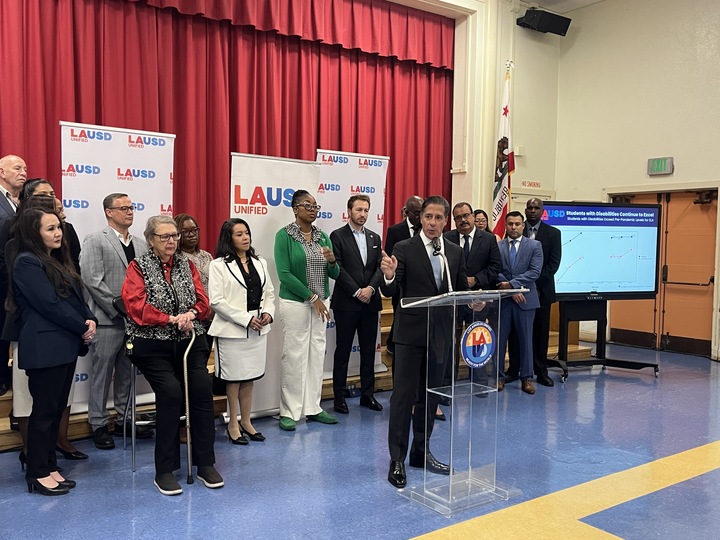
LAUSD Superintendent Alberto Carvalho applauds the district’s improvement in state test scores.
Credit: Mallika Seshadri
This story has been updated to include more community voices.
The Los Angeles Unified School District celebrated its students’ academic achievement in the 2024 California Smarter Balanced test scores during a press conference Friday. The district’s scores reflect a near realization of Superintendent Alberto Carvalho’s 2022 promise to overcome pandemic learning losses within two school years.
Across each grade level, most demographics and LAUSD’s Priority Schools, the district showed growth in both English Language Arts (ELA) and math.
Between the 2022-23 and 2023-24 academic years, scores in English Language Arts increased from roughly 41% of students meeting or exceeding standards to just over 43%.
Math scores also rose. In the 2022-23 academic year, 30.5% of LAUSD students met or exceeded state standards. This past year, that number grew to 32.83%.
“I made a prediction about two years ago that within two years, we would begin to see recovery at a level impacting some subgroups that would hit or exceed pre-pandemic levels,” Carvalho said.
“I am heartened by the fact that the students who historically performed at the lowest levels are actually the ones that have already exceeded pre-pandemic achievement levels.”
Carvalho added that LAUSD’s Black and Latino students outperformed their counterparts throughout the state. Meanwhile, both students with disabilities and English learners performed better than they did before the pandemic.
While district officials say they are prepared to maintain students’ level of performance, they are dealing with the end of the one-time Covid relief money that expired last month and pressing federal and state legislators for more support moving forward.
“I believe that to the bottom of my gut and my heart, that we have to provide the conditions where every child can learn. And that means smaller class sizes. It means more mental health support. It means a nurse at every school. It means [psychiatric social workers] at every school. It means things that right now we can no longer afford because the Covid money is gone,” said LAUSD’s school board president Jackie Goldberg during the event.
“This is remarkable, but if we’re to keep it forward, the state has got to find a way….to do something.”
How did the district’s highest needs students perform?
Students with disabilities showed a roughly 1% increase in scores compared to the previous year. Still, just over 13% of LAUSD students with disabilities met or exceeded California ELA standards, with nearly 11% meeting or exceeding math standards.
Homeless students’ performance remained roughly the same as the previous year — with marginal increases, less than 1% in both subject areas. Foster youth, meanwhile, experienced a slight decline in ELA scores — with just over 20% meeting or exceeding standards — and a slight increase to 13.08% in math.
Migrant students performed better on the 2023-24 tests, and English learners saw a significant jump in improvement.
Between the 2022-23 and 2023-24 academic years, the number of English learners who met or exceeded state ELA standards doubled from 4.44% to 8.88%. Meanwhile, the percentage of English learners who met or exceeded math standards rose from 6.80% to 10.65%.
“Los Angeles is not like the rest of the state of California. The challenges in our community are far greater. The level of poverty is higher. The percentage of students who are English language learners is significantly higher. The percentage of students with disabilities is higher. The percentage of students who are newly arrived international newcomers is significantly higher. The percentage of students experiencing homelessness is unparalleled,” Carvalho said Friday.
“That is why anytime that the unnatural, the almost impossible becomes the inevitable, we ought to come together and celebrate.”
Not everyone agrees. Evelyn Aleman, the organizer of the Facebook group Our Voice/Nuestra Voz, maintained that the district’s scores are still not adequate and that more investments need to be made to support student achievement.
“We cannot be satisfied with substandard scores,” she said, “…especially for vulnerable, high-need, student populations. There are no gains when most of our children aren’t meeting state standards in basic subjects.”
How much variation was there between non-charter and charter schools?
In both English Language Arts and mathematics, LAUSD’s charter schools outperformed non-charters.
Roughly 49% of students in district charters met or exceeded standards in English Language Arts and just above 35% met or exceeded standards in math compared to non-charters where just over 40% met or exceeded English Language Arts standards, and just over 30% met or exceeded standards in math.
How did students perform in science?
While LAUSD’s scores in science rose, they are still lagging behind other subject areas.
In the 2023-24 academic year, nearly 24% of LAUSD students met or exceeded state standards in science in comparison to 22.17% the previous year.
What strategies helped at the local level?
While district officials emphasized that a lot of work is required to sustain and improve this year’s numbers, they also said their growth reflects the hard work of LAUSD’s teachers and employees at every level.
“We’ve [improved our scores] by intention,” said Elesia Watkins, the principal of 54th Street Elementary, “intentionally ignoring the stigma that Black and Brown children cannot achieve greatness.”
Principals from other LAUSD schools with increased scores chimed in, emphasizing the importance of tracking data and making sure students are also aware of where they stand and what they need to work on.
Others stressed the importance of students participating in both lab enrichment classes along with elective courses every day — and even after school hours, if possible.
Student board member Anely Cortez Lopez also applauded the hard work and resilience of the student body.
“I believe it will be wrong with me not to highlight the immense resilience and dedication our students have shown,” she said. “We have seen an unprecedented event occur, many falls….not only academically, but emotionally, physically and spiritually for many of our students. ”
“But [we] were dedicated to bounce back better.”

